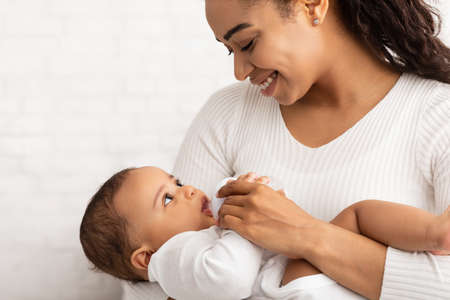Introduction to Early Communication in Babies
Understanding early communication cues is a crucial aspect of supporting your baby’s development, especially for parents and carers across the UK. During the first months of life, infants use a variety of sounds, movements, and facial expressions to communicate their needs and feelings, long before they are able to speak. Being able to recognise and respond appropriately to these early cues helps build a secure attachment between you and your baby, laying the foundation for healthy emotional and language development.
In the UK, health visitors and midwives often emphasise the importance of tuning in to your baby’s signals as part of responsive parenting. Recognising when your baby is hungry, tired, overstimulated, or simply seeking comfort not only supports their well-being but also fosters trust and confidence in both babies and adults. This early interaction can help prevent frustration for both parties and contribute positively to your child’s social skills and cognitive growth.
| Communication Cue | Possible Meaning | How to Respond |
|---|---|---|
| Crying | Hunger, discomfort, tiredness | Check nappy, offer feed, cuddle or soothe |
| Smiling | Contentment, recognition | Smile back, talk gently, maintain eye contact |
| Fussing | Boredom, need for attention | Change activity, offer a toy or comfort |
By observing these signals carefully, parents and carers can better understand what their baby is communicating. This proactive approach not only strengthens your bond but also gives your little one a strong start in their journey towards effective communication.
Key Communication Cues in the First Year
During a babys first year, parents and caregivers across the UK observe a fascinating range of early communication cues. Understanding these signals is vital for nurturing healthy development and building a strong parent-infant bond. Babies express themselves through various behaviours long before they can speak, and being able to interpret these cues helps adults respond to their needs effectively.
Common Early Communication Cues
| Cue | Description | Typical Age Observed | How to Respond (UK Context) |
|---|---|---|---|
| Crying | The primary way babies communicate discomfort, hunger, tiredness, or need for attention. Crying can vary in pitch and intensity depending on the need. | From birth onwards | Check for common needs (nappy change, feeding, cuddles). In the UK, health visitors often recommend responsive soothing rather than letting babies “cry it out” at this stage. |
| Cooing | Soft vowel-like sounds that signal contentment and social engagement. Cooing is an early attempt at vocal interaction. | Around 6-8 weeks | Engage with your baby by talking back or mimicking their sounds. British health professionals encourage parents to have ‘conversations’ with their baby, supporting early language development. |
| Eye Contact | Babies seek out faces and maintain eye contact as a way of connecting and learning from caregivers. | From birth; more sustained by 6 weeks | Hold your baby close and make gentle eye contact during feeds and playtime. In the UK, making eye contact is seen as fundamental for bonding and emotional security. |
| Facial Expressions | Smiling, frowning, or widening eyes are non-verbal ways babies share feelings or reactions to their environment. | First smiles appear around 6-8 weeks | Mirror your babys expressions to show understanding and encourage interaction. Smiling back reinforces positive communication habits valued in British parenting culture. |
Recognising and Responding to Baby’s Signals Across the UK
It’s important to remember that while these cues are universal, each baby is unique. British families often benefit from support provided by local health visitors or community groups who help interpret these cues within the context of daily life. By paying close attention to crying patterns, cooing sessions, eye contact moments, and facial expressions, parents can foster secure attachments and lay strong foundations for future speech and language skills.

3. Typical Milestones in Baby Language Development
Understanding your babys early communication cues is essential for nurturing their language development. According to UK health guidance, there are several key milestones that most infants reach within their first year. These milestones include both speech and non-verbal communication skills, forming the foundation of future language abilities.
| Age | Speech Milestones | Non-Verbal Communication |
|---|---|---|
| 0-3 months | Cries differently for different needs (e.g. hunger, discomfort) | Makes eye contact, responds to familiar voices, startles at loud noises |
| 4-6 months | Begins cooing and gurgling, starts babbling with varied sounds | Smiles socially, watches faces intently, turns head towards sounds |
| 7-9 months | Babbles repetitive syllables like “ba-ba” or “da-da” (not yet meaningful) | Uses gestures such as reaching or pointing, recognises own name |
| 10-12 months | Might say simple words like “mama” or “dada” with meaning, tries to imitate speech sounds | Waves goodbye, uses other gestures to communicate wants or needs, shows understanding of basic instructions (e.g. “no”) |
It’s important to remember that each child develops at their own pace; however, being aware of these general milestones can help you recognise your baby’s progress. If you have concerns about your childs communication development, consult your health visitor or GP for further advice and support. Early recognition and understanding of these cues provide a strong foundation for healthy language development in line with UK standards.
4. Practical Ways for Parents to Support Baby Communication
Supporting your baby’s early communication is a rewarding journey, and UK parents and carers can make a big difference with some practical strategies. Here are key tips and local resources to help you nurture your little one’s language development.
Responsive Interaction
Being attentive and responsive to your baby’s cues is crucial for fostering communication skills. When your baby coos, babbles, or gestures, respond warmly by making eye contact, smiling, and talking back. This two-way interaction helps babies learn the basics of conversation and builds their confidence in expressing themselves.
Use Everyday Talk
Integrating language into daily routines makes learning natural and fun. Describe what you’re doing as you dress, feed, or play with your baby. For example, say, “Now we’re putting on your blue socks,” or “Let’s wash your hands before tea.” Narrating daily activities helps babies associate words with actions and objects.
Everyday Activities to Boost Communication
| Activity | How to Encourage Communication |
|---|---|
| Nappy changing | Singing songs or describing each step |
| Bath time | Talking about water, toys, and body parts |
| Walks in the park | Pointing out and naming animals, flowers, and people |
| Meal times | Discussing colours, textures, and tastes of foods |
Accessing Local UK Resources
The UK offers a wealth of resources for parents keen to support their child’s communication. Health visitors are an excellent source of guidance during routine check-ups. Many local libraries host Rhyme Time sessions where you can join other families for singing and storytime—ideal for building early language skills in a social setting. Children’s Centres across the UK also provide workshops and playgroups focused on early years’ development.
Useful UK Resources:
- NHS Start4Life website: Tips on speech and language milestones
- The National Literacy Trust: Free advice and activity ideas for families
- I CAN (the children’s communication charity): Information for parents about supporting speech development
By actively engaging with your baby using these practical approaches—and making use of available local services—you’ll lay strong foundations for their future communication skills.
5. When to Seek Additional Support
While every baby develops at their own pace, recognising when your child may need additional support is essential for promoting healthy communication development. As parents and caregivers in the UK, it is important to be aware of signs that might indicate a need for further assessment and to know where to find professional guidance.
Recognising Signs That May Warrant Further Assessment
If you notice any of the following signs in your baby’s early communication, it may be helpful to discuss your observations with a healthcare professional:
| Sign | Age Range | What to Look For |
|---|---|---|
| No smiling or eye contact | By 2 months | Your baby rarely smiles at people or avoids looking at faces |
| Lack of babbling | By 6-9 months | Your baby does not make sounds like “ba-ba” or “ga-ga” |
| No response to sounds or voices | By 6 months | Your baby doesn’t turn towards sounds or respond to familiar voices |
| No gestures (e.g., waving, pointing) | By 12 months | Your baby isn’t using hands to communicate basic needs or interests |
| No words spoken | By 18 months | Your baby hasn’t started saying single words like “mummy” or “daddy” |
| Regression of skills | Any age after previously achieved milestone | Your baby loses previously acquired communication abilities (e.g., stops babbling or making eye contact) |
Where to Find Support in the UK
The NHS provides a range of resources and professionals who can offer assessment and support:
- Health Visitor: Your local health visitor can assess your child’s development during routine reviews and refer you to specialist services if necessary.
- GP (General Practitioner): If you have concerns, book an appointment with your GP, who can arrange further assessments or referrals.
- NHS Speech and Language Therapy: Referral through your GP or health visitor gives access to speech and language specialists experienced in early childhood communication difficulties.
- NHS Choices Website: For information on child development milestones and local services: NHS Baby Development Page
- Local Children’s Centres: Many centres offer parenting groups and drop-in sessions with professionals trained in early years’ development.
When Should You Act?
If you are concerned about your baby’s communication development, it is always best to seek advice sooner rather than later. Early intervention can make a significant difference in supporting your child’s language skills and overall well-being. Remember, you are not alone—UK healthcare professionals are here to guide you every step of the way.
6. Useful Resources for Further Learning
For parents and caregivers seeking to deepen their understanding of early communication cues and baby language development, accessing trustworthy information and support is essential. Below is a list of reliable UK-based organisations, helplines, and websites that provide expert guidance, resources, and further learning opportunities on this important topic.
| Organisation/Service | Description | Contact / Website |
|---|---|---|
NHS Start4Life |
Comprehensive advice on baby communication milestones, bonding, and health from the NHS. | NHS Start4Life |
ICAN – Children’s Communication Charity |
UK charity specialising in children’s speech and language development with tips for supporting early communication. | ican.org.uk |
The Communication Trust |
Offers information and resources for parents to support childrens speech, language, and communication skills. | thecommunicationtrust.org.uk |
NHS 111 Helpline |
Around-the-clock telephone helpline for urgent child health queries or concerns about development. | Dial 111 (UK only) |
Family Lives (Parenting Helpline) |
Confidential support and advice for parents on all aspects of early childhood development. | Call 0808 800 2222 familylives.org.uk |
The National Childbirth Trust (NCT) |
Provides courses, articles, and forums on parenting, including baby communication skills. | nct.org.uk |
Speech and Language UK |
Practical advice for recognising and responding to early speech and language difficulties. | speechandlanguage.org.uk |
Action for Children |
Support programmes and resources for families on child development and communication. | actionforchildren.org.uk |
How These Resources Can Help You
- Expert Guidance: Access evidence-based advice tailored to the UK context.
- Helpline Support: Speak directly with professionals if you have immediate questions or concerns about your babys communication development.
- Workshops & Groups: Join local or online parenting courses to build confidence in recognising and responding to your babys early cues.
- Printable Materials: Download leaflets and guides for easy reference at home.
- Community Connections: Engage with other UK parents through forums or group sessions to share experiences and learn together.
If Youre Concerned About Your Babys Communication Development…
If you notice that your baby isn’t reaching expected communication milestones or if you have any worries, don’t hesitate to contact your Health Visitor or GP. Early intervention can make a significant difference in supporting your child’s language journey. The above resources are designed to empower you with knowledge, reassurance, and practical strategies as you nurture your baby’s first steps in communication.


